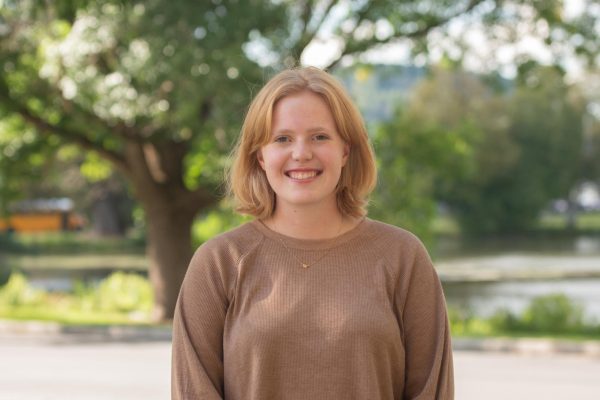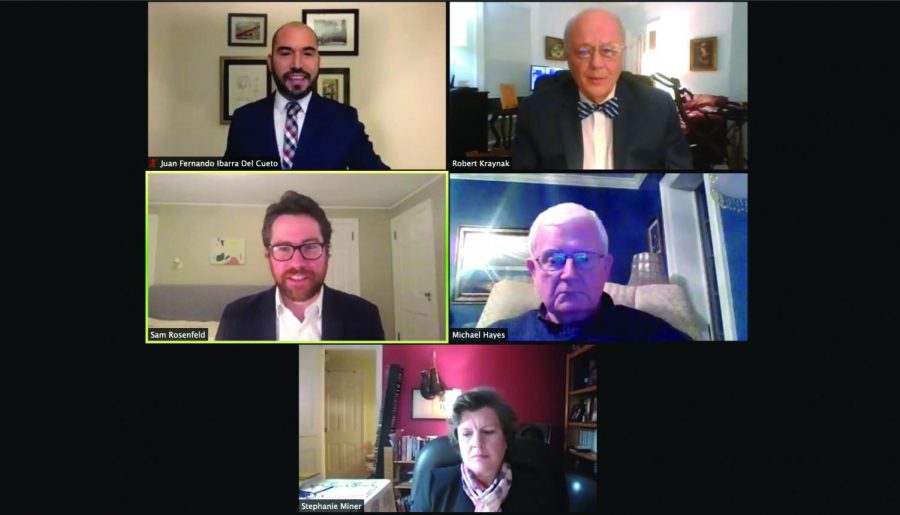Alumni Relations Hosts Post-Election Panel of Political Science Faculty
Colgate University’s Office of Alumni Relations hosted a panel of Political Science faculty to discuss the recent general election. Titled “What Happened and What’s Next,” the webinar featured Assistant Professor of Political Science Juan Fernando Ibarra Del Cueto as a moderator and Assistant Professor of Political Science Sam Rosenfeld, Professor of Political Science and Director of the Center for Freedom & Western Civilization Robert Kraynak, Charles Evans Hughes Visiting Chair of Government and Jurisprudence in the Department of Political Science Stephanie Miner and Professor of Political Science Michael Hayes as panelists.
Held on Thursday, Nov. 5, the event was planned as part of a larger series of panels relating to politics that connected current students, faculty and staff to Colgate’s alumni network, according to Assistant Vice President for Advancement, Annual Giving and Professional Networks Jen Stone.
“In late August, the Professional Networks partnered with the Dean of the College office to deliver a series of programming for students during the Universal Quarantine. One of the events was centered around insights with our DC alumni insiders about the 2020 election. We partnered with the Colgate Vote Project on this effort. Following that successful and insightful event, alumni and students inquired as to whether we would consider a follow-up event after the election, and hence this event featuring our Political Science faculty came together,” Stone said.
The event presented a variety of political viewpoints, allowing professors to have a discussion about their differing opinions. Given that many states had not announced projected race winners by the time of the panel, including the Presidency, the panelists had the opportunity to speculate different outcomes and the differing results of those hypothetical outcomes.
Senior Associate Director of Alumni Relations Jillian Cole said that events like these allow the broader Colgate community to connect and reflect with Colgate faculty about major national moments.
“The goal for this webinar is to share some of the expertise of our faculty with the broader Colgate community. It’s a chance for Colgate students, faculty, staff and alumni to hear from our on-campus experts about this important moment and what is ahead for the elected administration,” Cole said.
Alumnus James Speight graduated as a political science major in 2014 and now sits on the Alumni Council and President’s Club Membership Council. Speight, who gave opening remarks at the webinar, reflected on the success of the event.
“I thought the event was wonderful and did an excellent job of providing insight into an election that at the time had yet to be decided, especially from various points of view, as each professor was able to provide context based on their specialty,” Speight said. “I personally appreciated the professors’ calls for more of our current political ethos as a society to be based more on finding common ground and moving forward than the current vilification of each party.”
The discussion covered a broad variety of topics such as this year’s voting processes and turnouts, polling accuracy and reception, polarization and factions of political parties, the importance of Georgia’s runoff Senate races and shifting party identity.
Professor Kraynak offered insights after the panel had concluded regarding what to think about after the results come in.
“Students should be aware that there is a real difference of opinions in this country,” Kraynak said. “Moving forward, if Biden wins the presidency, and the Republicans hold the Senate, we are in for a period of divided government.”
All the panelists spoke to the possible repercussions of a divided government and the possible party shifts resulting from widely differing opinions in American politics.
“In order for you to have a direction to move in you really need a leader who can unite all these constituencies. And right now there is no electoral advantage for either the Republicans or the Democrats to unite these,” Professor Miner said. “This is all going to be fought out and we’ll be having panels like this for a long time.”
While the panel did not come to an ultimate conclusion about election results or possible impacts of those results, it provided a variety of academic opinions allowing students, alumni and others in attendance to be educated on different points of view and the future of American politics.
Following the event, Professor Rosenfeld remarked that this election is a moment to reflect on America’s democratic process, and that what happens in 2020 could be important in understanding how future electoral contests could play out.
“I think we had different opinions but an important thing to take from is to try and derive from these election outcomes some thought about broader questions of system stability, democratic legitimacy, governance, etc.,” Rosenfeld said. “I thought it was a useful discussion to try and step back and think as we’re counting the votes, as we’re trying to figure out who’s winning, who’s losing what does this all amount to as to the functioning of American democracy and the American political system.”
Co-leader of the Colgate Vote Project junior Eliza Lloyd remarked on the importance of attending events of this nature to the political knowledge of the campus community.
“I think it’s just important that we go to things like this — keep ourselves as informed as possible and get different perspectives,” Lloyd said. “The whole issue with fake news and misinformation … the more we know, the more we can represent these issues and these systems in the correct way and form our opinions correctly.”

Elli Ament is a senior from Littleton, CO concentrating in history with a focus on cultural history and media. She has previously served as a Commentary...







